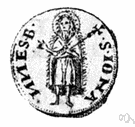guil·der
(gĭl′dər)n.
The primary unit of currency in the Netherlands before the adoption of the euro.
[Middle English gilder, alteration of Middle Dutch gulden, golden; see ghel- in Indo-European roots.]
American Heritage® Dictionary of the English Language, Fifth Edition. Copyright © 2016 by Houghton Mifflin Harcourt Publishing Company. Published by Houghton Mifflin Harcourt Publishing Company. All rights reserved.
guilder
(ˈɡɪldə) orgilder
;gulden
n, pl -ders, -der, -dens or -den
1. (Currencies) Also called: florin the former standard monetary unit of the Netherlands, divided into 100 cents; replaced by the euro in 2002
2. (Currencies) the standard monetary unit of Curaçao and Sint Maarten, divided into 100 cents
3. (Historical Terms) any of various former gold or silver coins of Germany, Austria, or the Netherlands
[C15: changed from Middle Dutch gulden, literally: golden]
Collins English Dictionary – Complete and Unabridged, 12th Edition 2014 © HarperCollins Publishers 1991, 1994, 1998, 2000, 2003, 2006, 2007, 2009, 2011, 2014
guil•der
(ˈgɪl dər)n.
1. the basic currency of the Netherlands, which has a fixed value relative to the euro.
2. the basic monetary unit of the Netherlands Antilles and Suriname.
3. a former gold coin of the Netherlands; florin.
4. the Austrian florin.
5. any of various gold coins formerly issued by German states.
Also called gulden. [1425–75; < Middle Dutch gulden gulden]
Random House Kernerman Webster's College Dictionary, © 2010 K Dictionaries Ltd. Copyright 2005, 1997, 1991 by Random House, Inc. All rights reserved.
ThesaurusAntonymsRelated WordsSynonymsLegend:
| Noun | 1. |  guilder - the basic unit of money in Suriname; equal to 100 cents guilder - the basic unit of money in Suriname; equal to 100 centsSurinamese monetary unit - monetary unit in Suriname |
| 2. | guilder - formerly the basic unit of money in the Netherlands; equal to 100 cents cent - a fractional monetary unit of several countries Dutch monetary unit - monetary unit in the Netherlands |
Based on WordNet 3.0, Farlex clipart collection. © 2003-2012 Princeton University, Farlex Inc.
Translations
gulden
den hollandske gyldengylden
guldenholland forint
gyllini
guldenis
gulden
Collins Spanish Dictionary - Complete and Unabridged 8th Edition 2005 © William Collins Sons & Co. Ltd. 1971, 1988 © HarperCollins Publishers 1992, 1993, 1996, 1997, 2000, 2003, 2005
guilder
n → Gulden m
Collins German Dictionary – Complete and Unabridged 7th Edition 2005. © William Collins Sons & Co. Ltd. 1980 © HarperCollins Publishers 1991, 1997, 1999, 2004, 2005, 2007